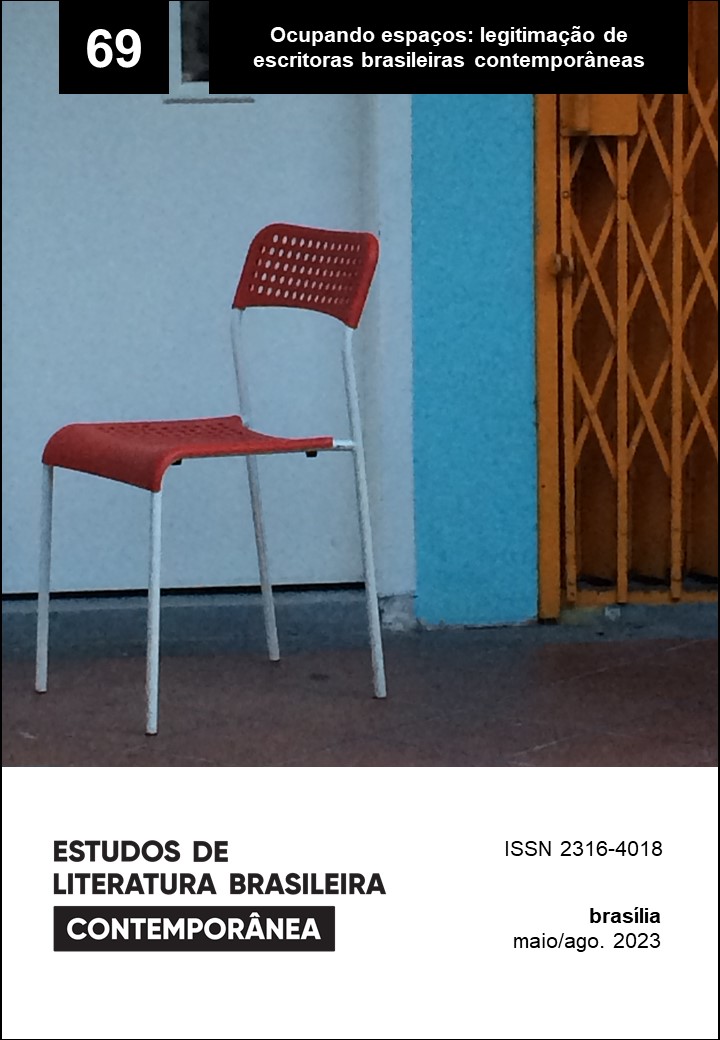Contested Narratives: afro-brazilian female representation in Maréia, by Miriam Alves
Keywords:
Afro-brazilian female literature; intersectionality; Miriam Alves; MaréiaAbstract
This article aims to discuss the women representation in Maréia, written by Miriam Alves (2019), as a space for legitimation of afro-brazilian female narratives. This approach highlights the occupation of contested territories (Dalcastagnè, 2012a, 2021b) in national literally scene as a strategy of representation and resistance in hegemonic narratives regarding afro-diasporic communities. From the construction of her female characters, Miriam Alves occupies the national literary territory inscribing subjects ethically and aesthetically committed to the rupture of racist and patriarchal representations. In this perspective, the concept of intersectionality will be used as an episteme, according to the propositions of Carla Akotirene (2019).
References
AKOTIRENE, C. (2019). Interseccionalidade São Paulo: Pólen.
ALMEIDA, S. (2020). Racismo Estrutural São Paulo: Jandaíra.
ALVES, M. (2019). Maréia Rio de Janeiro: Malê.
ALVES, M. A. (2020). Entrevista com Miriam Alves. Gláuks: Revista de Letras e Artes, v. 20, n. 2, p. 197-203. https://doi.org/10.47677/gluks.v20i2.216
» https://doi.org/10.47677/gluks.v20i2.216
BENISTE, J. (2020). Mitos Yorubás: o outro lado do conhecimento. 9. ed. Rio de Janeiro: Bertrand Brasil.
BHABHA, H. K. (2010). O local da cultura Belo Horizonte: Editora UFMG.
Crenshaw, K. (1989). La interseccionalidad en la Discriminación de Raza y Género Disponível em: https://static.tumblr.com/7symefv/V6vmj45f5/kimberle-crenshaw.pdf Acesso em: 13 out. 2022.
» https://static.tumblr.com/7symefv/V6vmj45f5/kimberle-crenshaw.pdf
DALCASTAGNÈ, R. (2012). Um território contestado: literatura brasileira contemporânea e as novas vozes sociais. Iberic@l, n. 2. Disponível em: https://iberical.sorbonne-universite.fr/wp-content/uploads/2012/03/002-02.pdf Acesso em: 16 nov. 2022.
» https://iberical.sorbonne-universite.fr/wp-content/uploads/2012/03/002-02.pdf
DALCASTAGNÈ, R. (2021). Literatura brasileira contemporânea: um território contestado. Vinhedo: Horizonte, 2021.
EVARISTO, C. (2020). A escrevivência e seus subtextos. In: DUARTE, C. L.; NUNES, I. R. (org.). Escrevivência: a escrita de nós – reflexões sobre a obra de Conceição Evaristo. Rio de Janeiro: Mina Comunicação e Arte. p. 26-47.
GONZALEZ, L. (2011). Por um feminismo afro-latino-americano. In: CÍRCULO PALMARINO (org.). Afro-latino-América São Paulo: Círculo Palmarino. (Caderno de Formação Política, n. 1.) Disponível em: https://edisciplinas.usp.br/pluginfile.php/375002/mod_resource/content/0/caderno-de-forma%C3%A7%C3%A3o-do-CP_1.pdf Acesso em: 13 out. 2022.
GONZÁLEZ, L. (1983). Racismo e sexismo na cultura brasileira. In: SILVA, L. A. et al. Movimentos sociais urbanos, minorias e outros estudos Brasília: ANPOCS, 1983. (Ciências Sociais Hoje.) v. 2. p. 223-244.
HAMPÂTÉ BÂ, A. (2010). A tradição viva. In: KI-ZERBO, J. (org.). História Geral da África: Metodologia e Pré-História da África. 2. ed. Brasília: Unesco. p. 167-212. Disponível em: https://filosofia-africana.weebly.com/uploads/1/3/2/1/13213792/amadou_hampat%C3%A9_b%C3%A2_-_a_tradi%C3%A7%C3%A3o_viva.pdf Acesso em: 12 fev. 2021.
INSTITUTO DE PESQUISA ECONÔMICA APLICADA (IPEA) (org.). (2021). Atlas da Violência 2019 Brasília: Instituto de Pesquisa Econômica Aplicada.
LEHNEN, L. (2015). Apresentação: Narrativas fora do lugar. Estudos de Literatura Brasileira Contemporânea, n. 45, p. 13-20. https://doi.org/10.1590/2316-40184523
» https://doi.org/10.1590/2316-40184523
LEITE, F. (1996). Valores civilizatórios em sociedades negro-africanas. África: Revista do Centro de Estudos Africanos, São Paulo, n. 18-19, p. 103-118. Disponível em: https://www.revistas.usp.br/africa/article/view/74962 Acesso em: 5 fev. 2021.
» https://www.revistas.usp.br/africa/article/view/74962
MARTINS, L. M. (1997). Afrografias da Memória: o Reinado do Rosário no Jatobá São Paulo: Perspectiva; Belo Horizonte: Mazza Edições.
NOGUERA, R. (2011). Denegrindo a filosofia: o pensamento como coreografia de conceitos afroperspectivistas. Griot – Revista de Filosofia, v. 4, n. 2, p. 1-19. https://doi.org/10.31977/grirfi.v4i2.500
» https://doi.org/10.31977/grirfi.v4i2.500
ROWELL, C. H.; ALVES, M. (1995). Miriam Alves: Uma entrevista. Callaloo v. 18, n. 4, pp. 970-972. Disponível em: https://www.jstor.org/stable/3298924?read-ow=1&refreqid=excelsior%3A63f0553fe219d319ce871864d0829581&seq=1#page_scan_tab_contents. Acesso em: 20 set. 2021.
Saffioti, H. (2015). Gênero, Patriarcado e Violência São Paulo: Expressão Popular.
SCHECHNER, R. (2000). Performance: teoría y prácticas interculturales. Buenos Aires: Universidad de Buenos Aires.
SCHIFFLER, M. F. (2017). Literatura, oratura e oralidade na performance do tempo. REVELL, v. 2, n. 16, p. 112-134.
SOUZA, F. da S. (2019). Maréia: histórias de mar e vida. In: ALVES, M. Maréia Rio de Janeiro: Malê. p. 7-10.
TAYLOR, D. (2012). Performance Buenos Aires: Asunto Impreso.
WALSH, C. (2012). Interculturalidad y (de)colonialidad: Perspectivas críticas y políticas. Visão Global, Joaçaba, v. 15, n. 1-2, p. 61-74.
WORLD ECONOMIC FORUM (2022). Global Gender Gap Report Cologny/Genebra: Weforum.
ZUMTHOR, P. (2018). Performance, recepção, leitura São Paulo: Ubu.
Downloads
Published
Issue
Section
License

This work is licensed under a Creative Commons Attribution-NoDerivatives 4.0 International License.
Authors who publish in this journal agree to the following terms:
a) The authors maintain the copyright and grant the journal the right of first publication, the work being simultaneously licensed under the Creative Commons Attribution License-Non Commercial 4.0 which allows the sharing of the work with acknowledgment of the authorship of the work and publication this journal.
b) Authors are authorized to enter into additional contracts separately, for non-exclusive distribution of the version of the work published in this journal (eg publish in institutional repository or as a book chapter), with authorship recognition and publication in this journal.
c) Authors are allowed and encouraged to publish and distribute their work online (eg in institutional repositories or on their personal page) after the editorial process, as this can generate productive changes, as well as increase the impact and citation of published work (See The Effect of Free Access).
d) The authors of the approved works authorize the magazine to, after publication, transfer its content for reproduction in content crawlers, virtual libraries and the like.
e) The authors assume that the texts submitted to the publication are of their original creation, being fully responsible for their content in the event of possible opposition by third parties.


